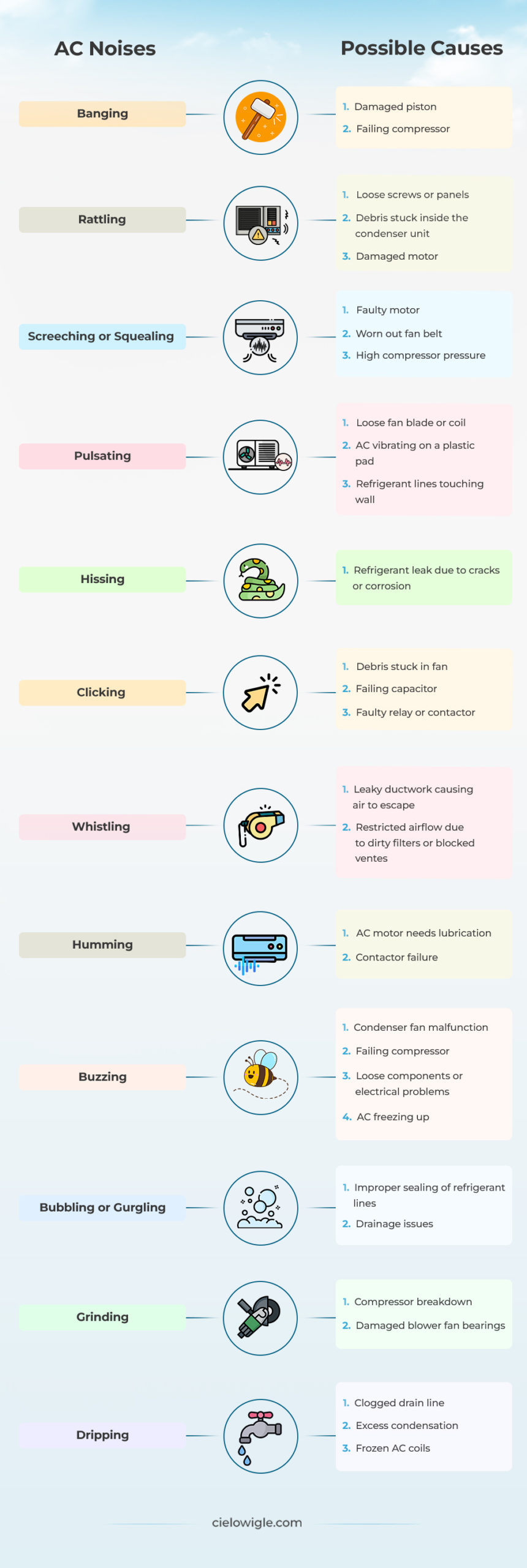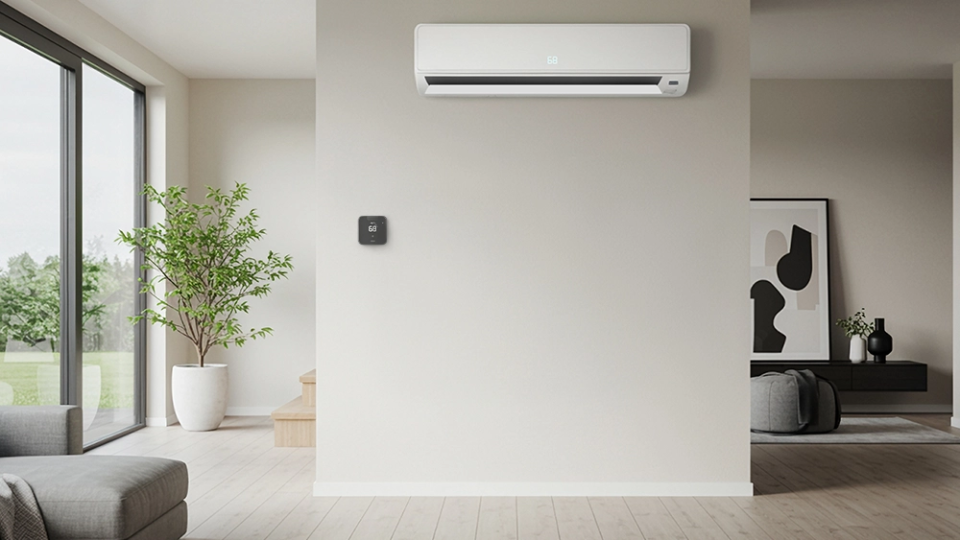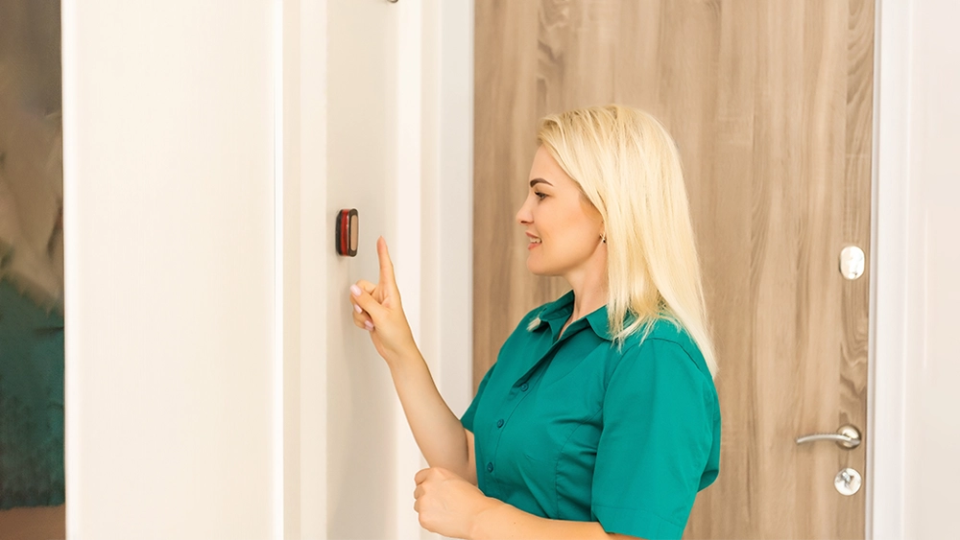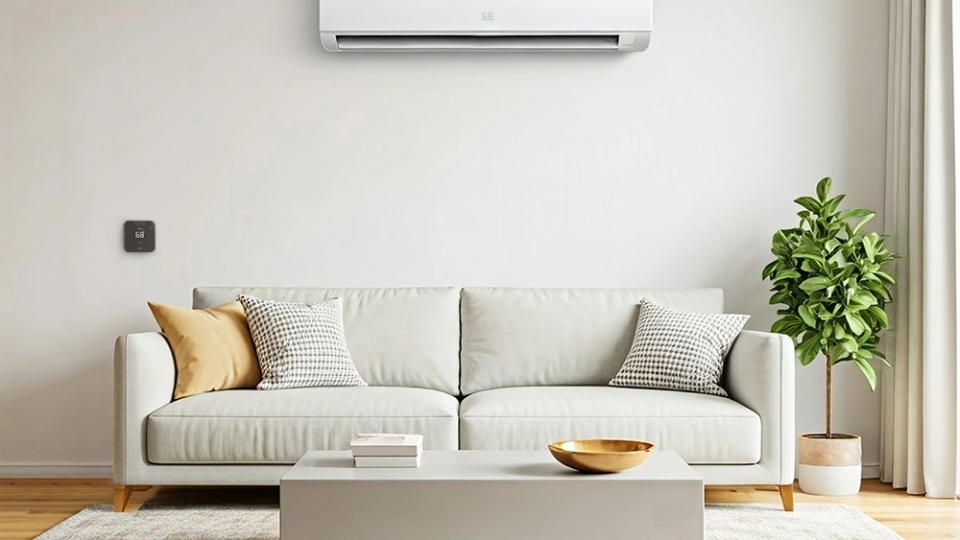
Key Takeaways
- Hissing or bubbling sounds indicate refrigerant leakage.
- Rattling noises mean there is something wrong with the AC motor.
- AC noises caused by refrigerant leaks, high compressor pressure, or electrical faults require professional assistance.
A quiet hum from your AC is normal, but if your air conditioner starts making noises, banging, clicking, or screeching, it’s time to pay attention. Unusual AC noises can indicate minor issues, such as loose parts, or more serious problems, like compressor failure. Ignoring these sounds may lead to costly repairs or a total breakdown.
In this blog, you’ll find a detailed breakdown of different AC noises and what they signify. This will help you troubleshoot and quiet a noisy air conditioner, improving unit lifespan and creating a peaceful indoor environment.
- 1. Banging Noise
- 2. Screeching or Squealing Noise
- 3. Air Conditioner Making a Pulsating Noise
- 4. AC Making a Hissing Sound
- 5. Clicking Sounds
- 6. Whistling Sound Coming from the AC
- 7. Air Conditioner Making a Humming Noise
- 8. Buzzing Air Conditioner Noise
- 9. Dripping Sound
- 11. Bubbling & Gurgling AC Noise
- 12. Rattling Noise
- How to Quiet a Noisy Air Conditioner
- Why You Should Not Neglect AC Noises?
Air Conditioner Noises & What They Mean

1. Banging Noise
If your AC unit is making loud banging noises, it is a warning sign that something inside the system is broken or malfunctioning.
Damaged Piston Pin
One common cause of banging noises is damage to critical internal components, such as a piston pin or connecting rod inside the compressor. These parts can wear out or become loose, creating a loud banging noise.
Compressor Failure
In many cases, persistent banging noises indicate that the compressor may be failing and may need to be replaced. The compressor is the heart of your AC system; if it’s damaged, it not only affects performance but can also lead to costly repairs.
Solution: Contact an HVAC technician for a thorough inspection. They can diagnose the exact cause of the compressor noise, perform necessary repairs, or recommend compressor replacement if needed.
2. Screeching or Squealing Noise

If you’re hearing a loud, high-pitched screech or squeal when your AC turns on or runs, it’s usually due to damage to the moving parts. Depending on the sound’s pitch and duration, the problem could range from worn-out fan motor bearings to belt damage or even dangerously high compressor pressure.
Faulty Motor
The motor bearings may become damaged, causing the motor to become off-center, which leads to a screeching noise. Another reason could be that your motor needs lubrication. Lack of lubrication can result in wear and tear. This leads to overheating and even system damage.
Solution:
- Contact a professional to inspect the motor and its bearings. They need to be repaired or replaced before they pose further damage.
- Lubricate the motor with the correct type of oil, either mineral or synthetic. Ensure it doesn’t contain any detergent.
Worn-out or Broken Fan Belt
In older ducted systems, a fan belt connects the motor to the blower. Over time, this belt can wear out or slip, especially in humid weather when it expands and contracts. The result? A loud squealing or chirping sound.
Solution: If the belt is frayed or cracked, it needs to be replaced. Contact an HVAC professional for replacement.
High Pressure in the Compressor
A sharp, continuous squeal, particularly from the outdoor unit, could mean your AC’s compressor is under dangerously high pressure. This can happen due to refrigerant overcharge or electrical issues in the unit.
Solution: Turn off your AC immediately and contact a professional. This is a safety hazard and can lead to system failure or worse, an explosion.
3. Air Conditioner Making a Pulsating Noise
If your AC is making a soft, slow pulsating sound during regular operation, it is completely normal. However, if the noise becomes loud, rhythmic, or feels like a thumping vibration, it’s a sign that something needs attention. This type of noise typically comes from loose components, vibration against surfaces, or the compressor moving against a weak base.
Loose Fan Blade or Coil
Over time, constant airflow and vibration can cause a fan blade to loosen slightly inside the unit. This can create a steady, pulsing noise as the loose part vibrates during operation.
Solution:
- Turn off the power. Open the access panel.
- Carefully inspect the fan blade and coils and tighten any loose screws
Note: Be cautious not to bend the fan blades or damage delicate coil fins.
Vibrating Plastic Base or Pad
If your AC unit is mounted on a plastic base or pad, the natural vibration from the compressor motor can cause the entire unit to move slightly. This movement creates a rhythmic pulsating or vibrating sound, especially on hard floors or decks.
Solution:
- Replace the plastic base with a wooden or concrete pad.
- Add rubber vibration dampeners beneath the unit.
Refrigerant Lines Touching the Wall
A refrigerant line touching the wall can lead to vibrations and friction between the lines and the walls, causing a pulsating noise.
Solution:
- Gently pull the lines slightly away from the wall.
- Add foam or rubber insulation sleeves between the line and the surface.
- Use pipe clamps or zip ties to secure them in place.
4. AC Making a Hissing Sound

If your air conditioner is making a sharp, continuous hissing noise, almost like a snake lurking inside, it typically indicates a refrigerant leak. Hissing sounds are often a sign of a serious issue and should not be ignored, as they can lead to system damage.
Leaking Refrigerant
The most common cause of hissing is a refrigerant leak. Over time, the refrigerant lines may develop cracks or corrosion, allowing gas to escape, which creates that distinct hissing sound. Low refrigerant means your AC won’t cool properly and can cause long-term damage to the compressor.
Solution: Refrigerant leaks require professional assistance. An HVAC technician will locate the leak, repair or replace the affected lines, and recharge the refrigerant to the proper level.
5. Clicking Sounds
A clicking noise when your air conditioner starts or stops is normal — it’s usually the sound of switches engaging or disengaging. However, persistent or repetitive clicking sounds during operation often signal underlying issues that need attention.
Obstruction in AC Fans
If your outdoor unit is clicking, the fan blades may be hitting debris, sticks, or other objects caught inside the fan housing.
Solution
- Turn off the unit and remove the outdoor cover.
- Carefully inspect and clean the fan blades.
- Remove any debris or stuck objects.
Failing Capacitor
The capacitor supplies the initial jolt of power to start the compressor and fan motors. If it’s damaged, you’ll hear rapid clicking as the unit attempts to start but fails.
Solution: If the capacitor is damaged, it must be replaced. Contact a professional for replacement.
Problem In the Relay Process
If you hear a repeated clicking sound from your HVAC system, it could mean something’s wrong with the thermostat’s relay, which is responsible for controlling the temperature. The electrical issues in your system can also interfere with the relay functions.
Solution: Contact an HVAC technician to handle the relay-related issues.
Note: Electrical faults can be dangerous and should never be handled without professional expertise.
Damaged Contractor
The part that links the thermostat to the compressor, called the contractor, might be worn out or damaged and could need replacing.
Solution: Call a professional to fix this issue.
6. Whistling Sound Coming from the AC
A high-pitched whistling sound can be due to various reasons:
Leaky Ductwork
A common reason for a high-pitched whistling sound is a leak in the ductwork. Air escapes through small holes or gaps, creating a whistling effect. It reduces your system’s efficiency, causes uneven cooling, and leads to high electricity bills.
Solution:
- Have your ductwork professionally sealed using mastic or foil-backed tape.
- Consider conducting an energy audit to identify any hidden leaks.
Pro Tip: Consider adding dampers to the ductwork to help control airflow and reduce noise.
Restricted Airflow
A whistling sound also indicates that something is restricting airflow in the ducts or supply vents. There may be dirt and debris obstructing the ductwork and vents. Dirty air filters also hinder the airflow, leading to weird AC noises.
Solution:
- Clean your AC filters regularly. Increase the cleaning frequency during the peak summer season.
- Make sure all supply and return vents are open and unobstructed.
- Avoid placing furniture directly in front of vents.
- Contact a ductwork specialist to inspect for any blockages and ensure your ducts are properly configured.
7. Air Conditioner Making a Humming Noise
A gentle humming noise from your AC, especially when it starts up, is usually normal. Nevertheless, if the humming grows louder or doesn’t stop, it could indicate a deeper issue. Let’s break down the most common causes and how to fix them.
Low Lubrication in the Motor
When an AC motor isn’t properly lubricated, it may start to hum softly. Over time, this can escalate into a grinding noise as friction increases.
Solution: You can lubricate the motor if you are familiar with the process. Call an HVAC technician t service the motor if you’re unsure or need a thorough maintenance check.
Contactor Failure
The contactor is the switch that controls electricity flow to your AC. If it’s stuck or failing, the unit may receive power but won’t turn on, and you’ll hear a persistent hum. If left unchecked, it can overheat and cause system failure or escalate into a loud buzzing noise.
Solution:
- Ensure all wiring connections are secure and properly tightened. Loose or faulty connections can lead to humming sounds and contactor failure.
- It’s essential to involve a qualified HVAC technician to diagnose and address any contractor-related issues accurately.
8. Buzzing Air Conditioner Noise
If your AC is making a buzzing noise, it’s often a sign that something inside the unit isn’t working properly. This sound may start small but can grow louder, signaling everything from loose components to serious electrical problems. Below are the most common causes and their corresponding solutions.
Condenser Fan Isn’t Working
A buzzing sound might mean the condenser fan in your outdoor unit isn’t working. If the indoor fan is running but you hear buzzing coming from outside, that’s a sign that the outdoor fan is having an issue.
Solution: Turn off your unit and inspect the condenser fan for any blockages. Remove any debris stuck inside. Once cleaned, turn your unit on and asses the fan condition. Here is a helpful guide on how to clean the outdoor AC unit.
Compressor Malfunction
When the compressor starts to fail but still receives power, it can create a continuous buzzing sound, especially from the outdoor unit. This is often one of the more serious causes and usually means the compressor can no longer regulate refrigerant flow properly.
Solution:
- Contact a certified HVAC technician for a professional diagnosis.
- Replace the compressor if it is confirmed to be faulty (this can be expensive, but is necessary).
Loose Parts
Buzzing or vibrating sounds can come from loose fan blades, screws, or panels inside the AC. As the unit runs, these parts shake against each other or the housing, producing a rattling buzz.
Solution: Visually inspect the unit for loose screws, panels, or components. Tighten any accessible and safe-to-adjust parts.
Contactor Issues
The contactor controls the power supply to your AC’s compressor and fan motor. If the contactor is damaged or stuck, it may create a humming noise that escalates into a loud buzz when the system attempts to start.
Solution: Have an HVAC technician test and replace the contactor
AC Freezing Up
Low refrigerant levels, clogged air filters, or setting the thermostat too low can result in your AC freezing up and creating unusual sounds.
Solution:
- Schedule a professional HVAC inspection to check refrigerant levels.
- In the meantime, turn off the system and clean the air filters.
9. Dripping Sound

When your AC runs, it removes moisture from the air, which collects in the drip pan. If you hear a dripping noise, it may indicate that the water isn’t draining properly.
Clogged Drainage System
Air carries various pollutants like dust, pet dander, and other small particles. When the air passes through your AC, these contaminants can collect in the drain pan and gradually accumulate inside. Keep your drain pan free of buildup for quieter, more efficient operation.
Solution:
- To clean a clogged AC drain line, pour a mixture of vinegar and water into the drain opening or use a wet/dry vacuum to suck out the blockage.
- To avoid serious blockages, it’s essential to regularly maintain your AC system and clear out any clogs promptly before they develop and block the entire pipe.
High Level of Condensation
Excess moisture buildup in your AC system can cause the drip pan to overflow. This is especially common during humid weather or if the pan hasn’t been emptied in a while.
Solution: Turn off your unit and locate the drain pan. Carefully empty the drain pan to resolve this issue.
Frozen AC Coils
If the evaporator coils freeze and then thaw, the melting ice can create dripping sounds. Clogged air filters, thermostat issues, or low refrigerant levels are often the cause of frozen coils.
Solution:
- Avoid running the AC if you suspect frozen components to prevent water damage.
- Keep air filters clean and replace them regularly to reduce the chance of freezing.
- Schedule a technician to inspect the coils and diagnose the cause of freezing.
10. Grinding Noise Coming From the AC Unit

Grinding noises from your air conditioner are never normal and typically indicate mechanical issues within the unit. These sounds typically originate from the compressor or blower fan and can worsen over time if left unaddressed.
Compressor Breakdown
If the grinding sound is coming from the outdoor unit, the compressor may be at fault. Worn-out pistons inside the compressor create this noise as they scrape against internal components during operation.
Solution:
- Contact a professional HVAC technician for a full compressor inspection.
- Replace the compressor if it’s confirmed to be malfunctioning (repairs are rarely cost-effective)
Damaged Blower Fan Bearing
Grinding sounds indicate that fan bearings have worn out or lost lubrication, causing metal parts to grind against each other.
Solution:
- Turn off your HVAC unit. Detach the panel the access the blower compartment.
- Lubricate the motor with oil – mineral or synthetic.
11. Bubbling & Gurgling AC Noise
Bubbling or gurgling noises in your AC can be subtle but still indicate serious underlying issues. These sounds are typically associated with drainage problems or issues related to refrigerant lines.
Improper Sealing of Refrigerant Lines
When air gets trapped in the refrigerant lines or a refrigerant leak occurs, it can produce a bubbling or gurgling sound. A hissing noise often accompanies this if the leak is active.
Solution: Have the refrigerant lines sealed by a licensed technician.
Drainage Issue
A clogged condensate line or a failing condensate pump can prevent proper drainage, resulting in bubbling noises.
Solution:
- Inspect the condensate line to determine if it is blocked. If it’s clogged, use a wire brush to clear out the debris stuck inside.
- Use 1-2 cups of distilled vinegar and pour it down the drain line. This will further help clear out the blockage.
- Regular maintenance is crucial in preventing the drain line from becoming clogged. Regularly flush it with a mixture of water and vinegar to keep it clean and prevent mold growth.
12. Rattling Noise
If your AC is making rattling noises, it can indicate various issues such as:
Loose Screws or Panels
Rattling noise is often a result of loose panels or screws. The natural vibration of the unit during operation can loosen screws over time.
Solution:
- Check the side panels and screws around the unit for any loose connections.
- Tighten them gently with a screwdriver.
Damaged Motor
If your AC is making a loud noise from inside the unit, it could be due to a broken fan motor or an imbalanced motor causing the bangs.
Solution: Have a professional inspect your motor and replace it if required.
Debris Stuck in the Condenser
Leaves, twigs, or small stones can get pulled into the outdoor unit, especially if shrubs or trees surround it.
Solution:
- Turn off the AC and take off the condenser cover.
- Remove any stuck debris, such as leaves or twigs, to prevent future clogs.
How to Quiet a Noisy Air Conditioner
Here are some practical tips to prevent a noisy AC:
Focus on Regular Maintenance
Keeping up with regular AC maintenance is the key to preventing issues that can lead to weird AC noises. Clean your filters every two weeks and replace them every three to four months. If you’re using room ACs such as mini-splits, Cielo Breez smart thermostats for mini-splits are quite helpful as they provide timely notifications when filters require cleaning.
Your best choice to make any mini-split, window,
or portable AC smart. Enhance your comfort and savings.

Inspect the outdoor unit every few months for loose screws, debris, and any signs of wear and tear. Before cooling season, schedule a pro inspection to check refrigerant levels and electrical connections.
Add Soundproofing
Even if your AC is working fine, its operational sound can be louder than you’d prefer. If you’re looking to reduce the noise from your AC, here are some ideas to help quiet things down:
- You can significantly cut down condenser noise by surrounding the outdoor unit with plants, shrubs, or a fence. These can act as a noise barrier, but ensure there’s enough space for air circulation.
- Cover the outdoor unit with an AC sound blanket.
Why You Should Not Neglect AC Noises?
When your air conditioner is acting out of the ordinary, such as making noise, it is trying to signal a problem that requires your attention. Neglecting unusual sounds from your HVAC unit can turn minor issues into something detrimental to your system’s health in the long run.
Taking care of your air conditioner through proper HVAC maintenance and regular professional inspections can help prevent unusual noises from your air conditioner. But even then, if you face such an issue, it’s best to find the cause as soon as possible. By solving such problems in a timely fashion, you can prevent expensive repairs further down the road.









14 Comments. Leave new
INSIDE AIR HANDLER FAN MAKES A HUMMING NOISE EVEN WITH THE AC OFF AND THE FAN TURNED ON CLEANED THE COILS THE DRAIN IS FINE..AS SOON AS THE POWER IS CUT TO THE FAN THE NOISE IS GONE
It can be due to some issue with your AC contactor. The contactor is responsible for controlling the flow of electricity to your unit. Contactor failure causes humming noises as the AC is getting power but cannot turn on. It’s best to consult an HVAC technician for this problem.
I have a problem. My new Lennox air conditioner hums at times. The noise is loud and disturbing. It gets louder and more disturbing, the longer the unit runs. when it’s loud, I can’t think.
It only happens during heating, like now, 5 am, November 29th, in Phoenix Az. When the a/c is cooling, no noise. When it heats, it makes the noise – the loud hum.
The a/c guys from Collins Comfort have not been able to stop the noise. the decibel level runs from 60 to 85.
Any ideas?
Since the noise is only coming in heat mode, it could be related to defrost mode. You will hear a loud noise in this mode as the system tries to melt the frost from its coils.
It’s best to consult an HVAC technician to find out the exact issue.
What is the reason for a loud boom sound every so often as the unit is running on? Is that the compressor kicking in? But why so loud now, like a boom!!!!
A loud banging noise may be due to a broken fan motor or a faulty compressor. Sometimes leaves or twigs can get stuck inside the outdoor unit, causing this type of noise.
All the info: Central Air has been used in 2022 already so we know it worked recently. Last 2 nights heard a 3-5 second buzzing sound, wasn’t sure until today it was the AC but now I know it was. Problem noticed last night when the thermostat was set to 70 but the house temp was 77 and the unit wasn’t running. This morning verified still wasn’t working (same stat readings as last night), identified double breaker was on in basement, went outside to find outer fuse box and acquired new fuses. Turned off breaker, installed new fuses, turned breaker on, heard same 3-5 second hum/buzz, went outside, unit not running, hum/buzz happened again. Can’t tell for sure but it seemed hum/buzz was coming from outer fuse box. Any ideas?
Hannah and Elysia, I’m having the exact same issue. My central AC unit is brand new (3/26/22) it, at night when I set the temp lower for sleep…. The inside unit kicks on, as does the outside unit however the outside unit is quiet until about 2/3 min when it starts making a short low humming noise about every 30-45 seconds this continues for about 6-7 min total at which time the “noise” kicks in (not just the fan sound) that is a low constant grumble which to me sounds like the compressor kicking in. This will be the 2nd time we’ve had this same issue with the “brand new AC unit” this being potentially the 2nd “compressor” malfunction. Any idea is greatly appreciated. Couch surfing with 3 pet’s and an amputee hubby in the “booked solid” Florida Keys sucks!!
My air conditioner fan started making a loud rhythmic humming sound every 45 seconds or so. The noise lasts for 1 second and stops. Then comes back 45 seconds later. This is the first day our air conditioner has been turned on this year. Any suggestions? thanks
Hi Charles, mumming noise can be due to AC motor having low lubrication levels. Loose parts inside your AC can cause vibrations that sound like humming. It’s best to contact a professional and have the issue thoroughly investigated.
When I was out working on my patio last night, I noticed that my air conditioner was making a very loud grinding noise. Thank you for suggesting that it might be a result of the lubrication being too low which can start out as a humming noise and then turn into a grinding noise.
A very informative article, the AC is normal during the afternoon, very quiet and peaceful but at night it becomes noisy. Really weird situation. Could it be voltage?
Hi, can you identify the type of noise?
Hey Hannah! What did you find out? Same thing here. When our tech came out during the day it wouldn’t make the noise and the voltage was fine, but at night when we turn the air down it starts up again. They said they think the motor is going…